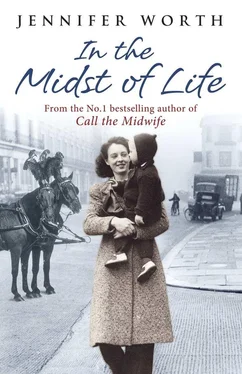Jennifer Worth - In the Midst of Life
Здесь есть возможность читать онлайн «Jennifer Worth - In the Midst of Life» весь текст электронной книги совершенно бесплатно (целиком полную версию без сокращений). В некоторых случаях можно слушать аудио, скачать через торрент в формате fb2 и присутствует краткое содержание. Жанр: Биографии и Мемуары, на английском языке. Описание произведения, (предисловие) а так же отзывы посетителей доступны на портале библиотеки ЛибКат.
- Название:In the Midst of Life
- Автор:
- Жанр:
- Год:неизвестен
- ISBN:нет данных
- Рейтинг книги:3 / 5. Голосов: 1
-
Избранное:Добавить в избранное
- Отзывы:
-
Ваша оценка:
- 60
- 1
- 2
- 3
- 4
- 5
In the Midst of Life: краткое содержание, описание и аннотация
Предлагаем к чтению аннотацию, описание, краткое содержание или предисловие (зависит от того, что написал сам автор книги «In the Midst of Life»). Если вы не нашли необходимую информацию о книге — напишите в комментариях, мы постараемся отыскать её.
In the Midst of Life — читать онлайн бесплатно полную книгу (весь текст) целиком
Ниже представлен текст книги, разбитый по страницам. Система сохранения места последней прочитанной страницы, позволяет с удобством читать онлайн бесплатно книгу «In the Midst of Life», без необходимости каждый раз заново искать на чём Вы остановились. Поставьте закладку, и сможете в любой момент перейти на страницу, на которой закончили чтение.
Интервал:
Закладка:
‘Yes, Sister.’
‘Mr P. doesn’t like carrots, so give him this one.’
‘Yes, Sister.’
‘Special diabetic diets for Mrs D. and Mrs H. Don’t get them mixed up, Nurse.’
‘No, Sister.’
‘There’s enough left over for the walking patients in the day room. Take it through to them please, Nurse, and see if anyone wants seconds.’
Yes, Sister.’
‘And Nurse…’
She turned, her voice bright and buoyant. ‘Sister …?’
Your cap is incorrectly folded. Attend to it before the afternoon, please.’
Her smile vanished, and her mouth tightened.
Yes, Sister,’ she muttered.
I knew just how she felt, having spent all my early nursing years kicking against the rules and regulations, but discipline had to be maintained …
The routine continued like clockwork, I, hopefully, remembering everyone’s needs and fancies. But one thing I never forgot whilst serving lunches was the mayhem I had caused one dinner time when I was a student nurse.
I was eighteen, nervous and clumsy, awkwardly trying to do my best, and failing at every attempt -every ward sister’s nightmare. I felt like a fish out of water in the rigid female hierarchy.
The sister of the ward on which I worked required a cannula that she did not have, and asked me to go to another ward to see if one might be borrowed. Filled with the importance of my commission I walked quickly (we were never allowed to run!) to Sister Collins’ ward. It was lunchtime, and no one was in sight. Assuming that the sister would be serving lunches I rushed eagerly into the kitchen. Sister and Staff were not there, but the food trolley was. The porters had left it crosswise to the kitchen door, which I was not expecting. I rushed in, and my whole body collided with it, causing the trolley to topple over and hit the floor. Dinners – meat and gravy, fish in white sauce, potatoes, cabbage, carrots, rice pudding, prunes, egg custard, stewed apple, jelly – everything shot across the kitchen floor and slithered under the sink. Horrified and rooted to the spot, I gazed at the scene. The trolley wheels turned slowly in the air; I turned and ran – yes, ran! – from the ward. Still no one was about, no one had seen me enter the ward or leave, so no one could possibly associate me with the disaster. Once round the corner, I slowed to a fast walk and went to another ward to request the loan of the cannula required by my ward sister. An hour later, in the nurses’ dining room, everyone was talking about the extraordinary upturning of a hospital food trolley full of dinners. I could never serve dinners without thinking of this, and if nurses saw me smiling, or heard me giggling quietly to myself, they must have wondered why …
After lunch I went to the male ward to supervise the moving of Mr Waters to the side ward. Not before time, I thought; that dreadful cough had been unsettling for the other men, but now his inability to cough was worse. Phlegm bubbled and rattled in his chest. Struggling with asphyxia, Mr Waters would die as hard as a man can die, unless drugs were given. I pulled the curtains around his bed and used suction to try to remove the excessive fluid bubbling up from his lungs.
‘I’m sorry about this beastly sucker, but it will make you feel better,’ I said, trying to avoid his panic-stricken eyes. His lungs were struggling under some terrible oppression and breathing was an intolerable strain. Any respiratory death is distressing to watch, but a natural anodyne – a sudden dimming of consciousness due to oxygen starvation of the higher centres of the brain – comes at the peak of suffering, and mental and physical deterioration descends as swiftly as a hawk dropping on its prey.
‘Mr Waters, we think you would be better off in the small room. It has two windows, and they can both be open all the time. It will make your breathing easier,’ I said softly. He nodded, and picked at the sheet. I was alone with him, but I could sense a figure hovering beside me. Could he see or feel this ghostly presence? None of us will know until we get there.
I had called the porters, and they arrived with a trolley.
‘I think it will be better if we move the whole bed, rather than lifting him on to a trolley, and then on to another bed,’ I said. It would be more difficult for them, because the corners were awkward, but they did not question my instructions.
Not an hour too soon, we moved him. Two days earlier he had been sitting upright in bed, leaning forward a little, his cheeks flushed, his lips tinged blue as his chest heaved tumultuously at four times the normal respiration rate. His eyes had been clear and his mind alert, as he noted people and things going on in the ward. Now the struggle to live had departed, and weariness had overtaken him.
I called a junior student nurse, and showed her how to fix up the oxygen and the sucker, and how to use them, and explained the details, which were so much better than ten years previously when I had been a student nurse. I told the girl (she was barely more than a child, with fresh features and the downy skin of youth) to stay with the dying man whilst I went to fetch the injections. What huge responsibility we place upon a nurse’s shoulders, I reflected, as I went to the dangerous drugs cupboard. So often they come straight from school, the classroom, the hockey field or the gym, and we expect them to remain with the dying, a task that the majority of mature people would run away from in fear and revulsion. Does this give nurses a heightened sensibility of living, to be so closely acquainted with death? Certainly, nurses always seem to be full of life and vitality, with an inexhaustible capacity for laughter. I had found in nurses none of the lethargy and self-absorption that one often noticed in young girls, contrary to what one might expect, given the nature of our work.
Radiotherapy could not help the malign growth in Mr Waters’ lungs. It may have halted the progress of the cancer by a hair’s breadth, but it made no real impression on the inexorable course of the disease. Mr Waters had smoked himself to death, and there was nothing that medicine could do to reverse the destruction. For two days he flickered in and out of consciousness, his lungs bubbling and gurgling as he slowly drowned. But his suffering was not as great as appearances suggested, because he received devoted nursing care – and the Brompton Cocktail every four hours. His mind was not conscious of his condition, or of his surroundings, and he showed no signs of pain. We did not try to bring him back from wherever he was, by forcing him to drink this or to take that, nor any of the multifarious futilities of energetic medicine. His perceptions were so dimmed by weakness and weariness that his life was ending slowly, in a dream state, rather than in true awareness.
Each morning when I came on duty I expected to find the side ward empty, but for two mornings he was still there. How extraordinary is life, that one can hang on in that condition, neither alive nor dead? But on the third morning the room was empty, and the night nurse reported that the flickerings of life had given way to the smothering curtain of death.
FAMILY INVOLVEMENT
Mr Elias Roberts had an enormous family, which seemed to expand with each passing day. They were Jamaican and had immigrated to England in the early 1950s, seeking a better life, better education, and better prospects for their children. They had stepped off the boats in their Sunday best, raw and hopeful, into an exhausted and war-torn England. A better time was a long way off. Jobs were plentiful because rebuilding Britain was a priority, but finding somewhere to live was near impossible. Mr Roberts had eventually found a single room at the top of a derelict house for himself, his wife and their two youngest daughters, but the older boys and girls had had to make their own way.
Читать дальшеИнтервал:
Закладка:
Похожие книги на «In the Midst of Life»
Представляем Вашему вниманию похожие книги на «In the Midst of Life» списком для выбора. Мы отобрали схожую по названию и смыслу литературу в надежде предоставить читателям больше вариантов отыскать новые, интересные, ещё непрочитанные произведения.
Обсуждение, отзывы о книге «In the Midst of Life» и просто собственные мнения читателей. Оставьте ваши комментарии, напишите, что Вы думаете о произведении, его смысле или главных героях. Укажите что конкретно понравилось, а что нет, и почему Вы так считаете.












